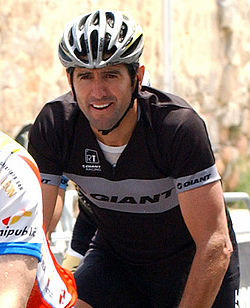Professional career
In 1992, Olano started his professional career at CHCS. This team shortly after disbanded, and he moved to Lotus. With Lotus, Olano won his first professional race, the Gran Premio de Villafranca de Ordizia in Gipuzkoa. [2]
In 1993, Olano switched to CLAS Cajastur, which was later merged with Mapei. Here, he started to win important races, such as the Vuelta a Asturias and the Spanish National Road Race Championships, both in road race and time trial.
In 1995, Olano won three stages in the Vuelta a España, finishing second in overall classification to Laurent Jalabert. [2] Later in the year Olano was a vital part of a hugely successful Spanish team at the World Cycling Championship in Colombia. [3] In the time trial, Olano took silver, finishing second to Miguel Induráin. In the road race, the top two positions was reversed, with Olano taking the championship and Indurain silver. The route for the road race was one of the hardest courses ever for a World Championship, and Olano showed his stamina by riding the last kilometer solo with a flat tyre. [4]
Olano established his abilities in stage races in 1996; he won the Tour de Romandie, finished third in the Giro d'Italia (leading the race at the second to last day), and finished ninth in the Tour de France. He also won the silver medal in the time trial at the 1996 Olympic Games, losing out to Miguel Induráin by a margin of only 12 seconds. [2]
Olano finished fourth in the 1997 Tour de France, taking 1 stage win – a long time trial in Disneyland, ahead of the eventual Tour winner Jan Ullrich.
In 1998, Olano won his only grand tour, the Vuelta a España, [2] fighting off furious challenges from mountain specialists Fernando Escartín and Roberto Heras as well as fellow all-rounders Laurent Jalabert and Alex Zülle, all at the height of their careers. Despite the victory, Olano was reportedly not happy with the support from the Banesto team and management. Banesto's own mountain specialist José María Jiménez took 4 stage wins, on several occasions leaving Olano alone on the climbs, and even taking the Yellow Jersey from his team captain. Olano won back the jersey on the second time trial, but the events and subsequent media speculation soured his relationship with Banesto, and he decided for a switch to the ONCE team for the following season.
Olano finished 1998 in style, winning the World Championship time trial in Valkenburg, ahead of compatriot Melcior Mauri. Olano was the first male rider of the modern era to win the World Championship in both the road race (1995) and the time trial (1998).
In 1999, Olano was back to defend the Vuelta title. In the prologue, severe rains put the late starters (including most of the GC contenders) at a big disadvantage, but Olano nevertheless managed to take 2nd place. In the stage 7 time trial, Olano won with a clear margin to main challenger Jan Ullrich, taking the top spot on the GC and the Yellow Jersey. Olano defended his lead through several mountain stages, but a crash on the stage to Alto de Angliru cost him a broken rib, and he was eventually forced to abandon the race.
In 2000, Olano made a shift in focusing on shorter stage races, and won Tirreno–Adriatico and Critérium International, among others. He would make his last mark at the grand Tours with a 2nd place in the 2001 Giro d'Italia. He retired from racing in 2002. [2]
On account of results early in his career, a Basque background and some physical similarities, Olano was seen by many supporters as the successor to five-times Tour de France winner Miguel Induráin. The comparison would haunt Olano for all of his career, as he went on to have a career that was very successful by almost any other standard. Olano was one of the very best time trialists of his generation, and a rider with enormous stamina. However, he was a reluctant climber, and a tendency to lose valuable time to the specialists on the steepest and highest climbs, would keep his number of Grand Tour wins to one.
